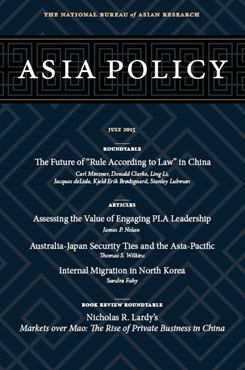China's Legal System and the Fourth Plenum
This essay is part of the roundtable “The Future of ‘Rule According to Law’ in China.”
Donald Clarke is the David A. Weaver Research Professor of Law at the George Washington University School of Law.
As the Chinese Communist Party (CCP) Central Committee’s first meeting specifically devoted to the legal system, the Fourth Plenum, held in October 2014, attracted a lot of attention from those interested in Chinese law. Anyone expecting the official Decision of the Fourth Plenum (subsequently referred to as the Decision) to show a Pauline conversion to the ideology of rule of law, however, would have been disappointed. Even if the leadership were to desire the system of accountability and institutionalized restraint on government that is generally understood by the term “rule of law,” it could not be accomplished anytime soon and would require changes in entrenched features of the current political and administrative system. But what about rule by law—a system of largely predictable and rule-governed behavior by lower-level government administrators, even if those giving the orders are not ultimately accountable or constrained? In this essay I will argue that the Fourth Plenum Decision represents modest progress toward that goal.
The big-picture summary is that the Decision contemplates no fundamental reform in the relationship between the legal system and the CCP. It is clear that, institutionally speaking, the party will remain above the law. At the same time, the Decision does contemplate some genuinely meaningful (and, in my opinion, positive) reforms. It also includes many things that might look meaningful but are not.
This essay will proceed by discussing first the continuing primacy of the CCP. It will then analyze in turn some major and then some minor, yet still meaningful, reforms to the legal system. It will conclude with a discussion of an important reform that was not made: a reform in the system under which local officials administer rules but do not make them. This system inevitably results in the highly discretionary application of rules and makes it difficult—perhaps impossible—to develop truly rule-based government.
Party First, Law Second
In general, whenever the party and the law appear in the same sentence in the Decision, the party comes first. Certainly, it comes first in some important places. For example, section one of the Decision lists several important principles that must be upheld in order to achieve the goal of ruling the state according to law. The first is leadership of the party.
Section six states that judges should be loyal to four things: the party, the state, the people, and the law. Notice which comes last. There is no reason, of course, why this sentence could not be interpreted as giving all elements equal value; in any list something must come first. But in a document like this, nothing—not even a comma—is accidental. The elements of this list come in the order they do for a reason. The “Three Supremes” (sange zhi shang), long associated with former Supreme People’s Court (SPC) president Wang Shengjun (on whose CV not a single day of legal education appears), are resurrected in the same section. Legal system personnel should give highest priority to the cause of the party, the interests of the people, and the constitution and laws—again, listed in that order. Lawyers must support the party’s leadership, and party cells in law firms should step up their activities.
About Asia Policy
Asia Policy is a peer-reviewed scholarly journal presenting policy-relevant academic research on the Asia-Pacific that draws clear and concise conclusions useful to today’s policymakers. Asia Policy is published quarterly in January, April, July, and October and accepts submissions on a rolling basis. Learn more


